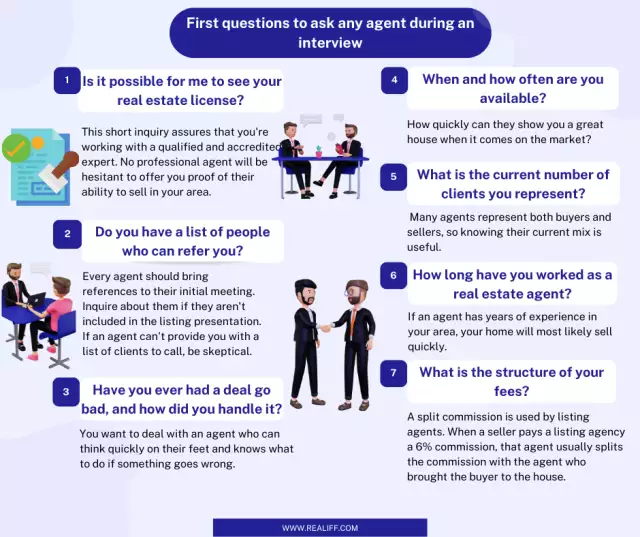25 Top Homebuyer Questions
Buying a homecan be a daunting process, especially for first-time homebuyerswho are unfamiliar with the intricacies of the real estate market. There are a lot of questions that homebuyers may have before making such a significant purchase, from how much they can afford to spend to the different types of mortgagesavailable. In this article, we'll cover 25 of the top homebuyer questions and provide answers to help make the home-buying processa little less overwhelming. Whether you're a first-time homebuyer or a seasoned buyer, this guide can help you navigate the complexities of the home-buying process with confidence.

How much can I afford to spend on a home?
Answer: This depends on your income, debt, expenses, and credit score. You can use a mortgage calculator or speak with a lender to determine your budget.
What kind of mortgage should I get?
Answer: There are various types of mortgages, such as fixed-rate, adjustable-rate, FHA, VA, and USDA. It's best to consult with a lender to determine which one suits your needs.
How much down payment do I need?
Answer: The down payment can range from 3% to 20% or more, depending on the type of loan you get. You can use a down payment calculator or speak with a lender to determine the amount.
How can I improve my credit score?
Answer: You can improve your credit score by paying bills on time, reducing credit utilization, disputing errors on your credit report, and keeping old credit accounts open.
What are the closing costs?
Answer: Closing costs include fees for title search, appraisal, loan origination, attorney fees, and prepaid expenses like property taxes and insurance.
Should I get a home inspection?
Answer: A home inspectioncan identify potential issues with the home, such as structural damage, plumbing issues, or mold.
How long does the home-buying process take?
Answer: The homebuying process can take 30 to 45 days, depending on the lender, the type of loan, and the complexity of the transaction.
What documents do I need to apply for a mortgage?
Answer: You will need to provide documentation such as pay stubs, tax returns, bank statements, and proof of employment.
What is the difference between pre-approval and pre-qualification?
Answer: Pre-qualification is a quick assessment of your financial situation, while pre-approval is a more thorough evaluation of your creditworthiness, income, and assets.
What happens if I can't make my mortgage payments?
Answer: If you can't make your mortgage payments, you risk foreclosure, which can lead to the loss of your home.
What is the difference between a fixed-rate and an adjustable-rate mortgage?
Answer: A fixed-rate mortgage has a fixed interest rate for the life of the loan, while an adjustable-rate mortgage has a variable interest rate that can change over time.
Can I negotiate the price of a home?
Answer: Yes, you can negotiate the price of a home with the seller, but it's important to do your research and make a reasonable offer.
What is a home warranty?
Answer: A home warranty is a contract that covers the cost of repairs or replacement of home systems and appliances due to normal wear and tear.
What is the difference between a real estate agent and a real estate broker?
Answer: A real estate agentis licensed to represent buyers or sellers in real estate transactions, while a real estate broker can manage their own real estate agency and oversee other agents.
What is title insurance?
Answer: Title insuranceprotects the buyer and lender against any defects in the title, such as liens or encumbrances, that may affect ownership or transfer of the property.
What is private mortgage insurance (PMI)?
Answer: PMI is insurance that protects the lender in case the borrower defaults on the loan. It is typically required for borrowers who put down less than 20% of the purchase price.
What is an earnest money deposit?
Answer: An earnest money deposit is a deposit made by the buyer to show their commitment to the purchase. It is typically 1% to 3% of the purchase price and is held in an escrow account until closing.
What is a home appraisal?
Answer: A home appraisal is an assessment of the value of the property by a professional appraiser. The appraisal is used by the lender to ensure that the property is worth the amount being borrowed.
What is a contingency?
Answer: A contingency is a condition that must be met before the sale can be completed. For example, a home sale may be contingent upon the buyer securing financing or a satisfactory home inspection.
What is a home equity loan?
Answer: A home equity loan allows homeowners to borrow against the equity in their homes. The loan is secured by the property and typically has a fixed interest rate and a fixed repayment term.
What is a home equity line of credit (HELOC)?
Answer: A HELOCis a revolving line of credit that allows homeowners to borrow against the equity in their homes. The interest rate is variable, and the borrower can withdraw funds as needed.
What is a title search?
Answer: A title search is an examination of public records to ensure that the seller has legal ownership of the property and that there are no liens or other encumbrances on the title.
What is a home inspection contingency?
Answer: A home inspection contingency is a clause in the purchase contract that allows the buyer to cancel the sale or negotiate repairs if the home inspection reveals any issues with the property.
What is a home warranty contingency?
Answer: A home warranty contingency is a clause in the purchase contract that requires the seller to provide a home warranty to the buyer. The warranty typically covers the cost of repairing or replacing home systems and appliances for a specified period.
What is the difference between a condo and a townhouse?
Answer: A condo is a type of ownership in which the buyer owns a unit within a larger building and shares ownership of common areas with other residents. A townhouse is a type of home that is attached to other homes and typically has its own yard and private entrance.

In conclusion, buying a homeis a significant investment that requires careful consideration and planning. By asking the right questions and seeking out knowledgeable professionals, such as real estate agents, lenders, and home inspectors, you can make informed decisions and find a home that meets your needs and budget. We hope that this guide has provided helpful answers to some of the top questions that homebuyers may have and that it will serve as a valuable resource as you embark on your homebuying journey. Remember to take your time, do your research, and seek out expert advice along the way. Good luck!



